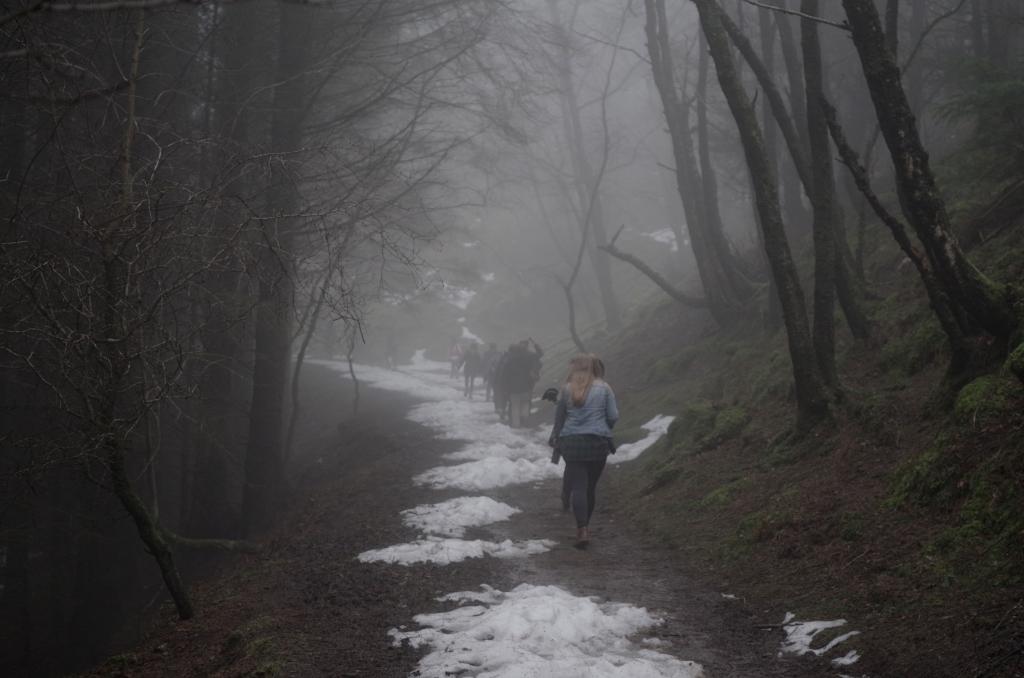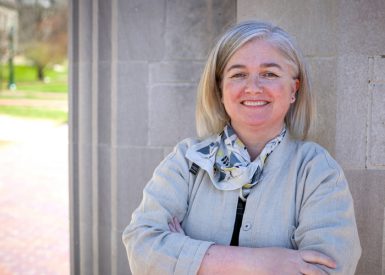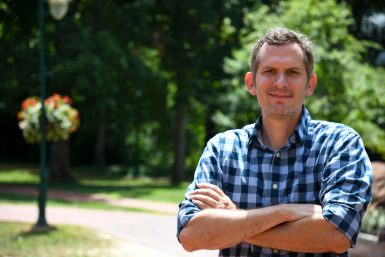Grand Expedition course to explore borders in the Brexit era

Deborah Cohn heard shouting from the streets of London in the middle of one night in June 2016.
She didn’t realize until morning that they were reactions to the outcome of the United Kingdom’s referendum vote to leave the European Union.
The professor of Spanish and Portuguese spent a year and a half in the U.K., witnessing firsthand the buildup and the chaotic aftermath of the country’s unexpected Brexit decision. Four years later, she’ll return to witness its implementation, with Media School faculty and students in tow.
The summer 2020 interdepartmental travel course Borders, Nation Formation, and the Transnational in the U.K., taught by Cohn, Media School professor of practice Elaine Monaghan and Media School senior lecturer Craig Erpelding, will explore the history of nation formation within the United Kingdom and document the critical changes it’s undergoing in the era of Brexit. The class will travel to England, Scotland, Ireland and Northern Ireland.
Borders, Nation Formation and the Transnational in the U.K. is available to students in The Media School, the Hamilton Lugar School of Global and International Studies and departments of the College of Arts and Science on a case-by-case basis. Students must apply to participate.
The course is part of the IU Bicentennial’s Grand Expedition offerings, a selection of Alumni Association, Overseas Study and IU Outdoor Adventures trips based on IU’s “summer tramps” from the 1880s and early 1890s. Summer tramps were some of the earliest examples of overseas programs offered by U.S. universities.

Monaghan, a veteran reporter and foreign correspondent, taught a Media School travel course in spring 2018 that took 16 students to Ireland and Northern Ireland to report on religion, culture and social and political change. Born in Scotland and trained through Reuters’ journalism training program in London, Monaghan has covered national and international conflicts in multiple countries. In Dublin, she led a team of reporters covering Northern Ireland’s “Good Friday” peace deal, which set out provisions for Northern Ireland’s status in the United Kingdom and relationship with the Republic of Ireland.
Students will travel to the U.K. from June 17-July 6 after spending spring semester honing journalistic skills, studying the U.K.’s history and preparing story ideas. Though the program isn’t anchored to any spring semester courses, the professors will teach a series of workshops throughout the spring.
Students will divide into reporting teams, with one team reporting at each of five stages of the trip. They’ll produce in-depth content and learn to use social media as a reporting tool. Working with Erpelding, one team of students will shoot footage for a documentary of the trip.
Monaghan said the course will combine theoretical exploration of ideas of transformation and nationhood with hands-on work.
“We will visit places where you can see the ideas of identity and borders in a very immediate way,” she said. “One of the places where that will happen is particularly relevant and in the news right now, which is at the Irish border, where we will be walking across the border and speaking to local people and historians and experts about the role that the border has played across the history of the island.”
That’s all particularly relevant at the moment because of Brexit, she said.
The Northern Irish land border, which separates the Republic of Ireland from Northern Ireland, was long a point of contention. It was the scene of military presence before a peace deal was agreed upon on Good Friday 1998, and has since become nearly inconsequential. Things could be more complicated post-Brexit, Monaghan said.
Students will also visit the east coast of Scotland to study puffins.
“We’re going to look at them as a sort of global phenomenon,” she said. “The students will come to understand how borders are insignificant to these creatures.”
They’ll also explore the impact of climate change on the birds, as well as the lives of the people trying to protect them.
Other destinations include London — where the professors plan for students to cover part of the junior Wimbledon championship — Hadrian’s Wall, Newcastle, Edinburgh, North Berwick and Dublin.

Erpelding said he and Monaghan wanted to match top journalism students with those capable of shooting compelling video and audio to create a powerful crossover between the school’s journalism and video production students.
Students involved in the documentary will focus exclusively on production during the trip, with post-production work taking place afterward.
“We wanted to devote the trip more toward production and then use time after the trip to really dig into the footage, reflect on the stories and put together the most dynamic documentary that we can,” Erpelding said. “This will allow students that could not be a part of the production trip and experience to still participate in the project via a postproduction course.”
Cohn said it’s important for students to learn where the stories they’ll be reporting fit into ongoing tensions.
“What we want students to understand is that the current Brexit crisis, which has exploded spectacularly in ways that we couldn’t have anticipated even if we knew it was going to be messy, is that this is a product not of the moment, but of longstanding historical moments,” she said.
Monaghan said she hopes the opportunity to learn about and experience these new settings as journalists will build students up as reporters, but also that it will be a transformative experience.
“I believe in the power of learning other cultures, of being able to move between cultures, of learning other languages, of understanding other peoples’ histories and seeing the world with other peoples’ eyes,” Monaghan said. “Journalism invites you to do that on a daily basis.”

